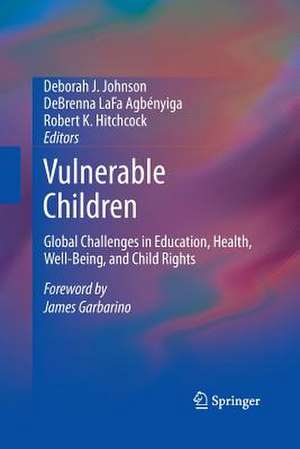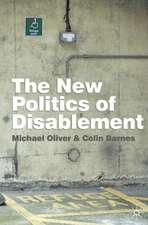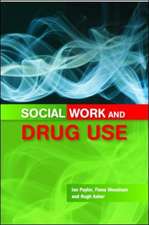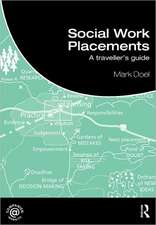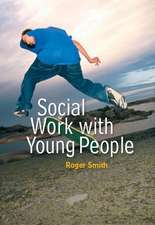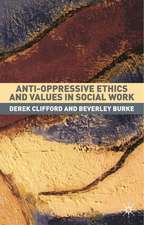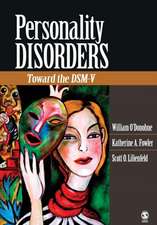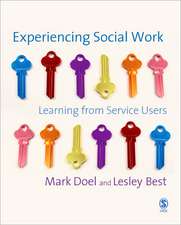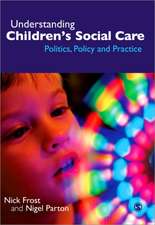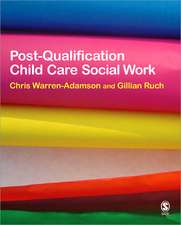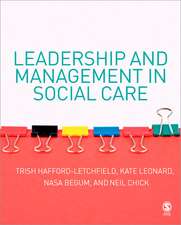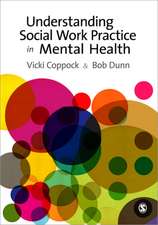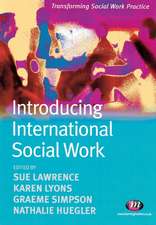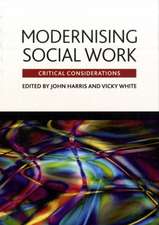Vulnerable Children: Global Challenges in Education, Health, Well-Being, and Child Rights
Editat de Deborah J. Johnson, DeBrenna LaFa Agbényiga, Robert K. Hitchcocken Limba Engleză Paperback – 19 mai 2015
The powerful interdisciplinary volume Vulnerable Children brings a global child-rights perspective to the lives of indigenous, refugee, and minority children in and from crisis-prone regions. Focusing on self-determination, education, security, health, and related issues, an international panel of scholars examines the structural and political sources of children's vulnerabilities and their effects on development. The book analyzes intervention programs currently in place and identifies challenges that must be met at both the community and larger policy levels. These chapters also go a long way to explain the often-blurred line between vulnerability and resilience. Included in the coverage:
- Dilemmas of rights-based approaches to child well-being in an African cultural context.
- Poverty and minority children’s education in the U.S.: case study of a Sudanese refugee family.
- The heterogeneity of young children’s experiences in Kenya and Brazil.
- A world tour of interventions for children of a parent with a psychiatric illness.
- An exploration of fosterage of Owambo orphans in Namibia.
- UNICEF in Colombia: defending and nurturing childhood in media, public, and policy discourses.
| Toate formatele și edițiile | Preț | Express |
|---|---|---|
| Paperback (1) | 1141.39 lei 6-8 săpt. | |
| Springer – 19 mai 2015 | 1141.39 lei 6-8 săpt. | |
| Hardback (1) | 1182.04 lei 6-8 săpt. | |
| Springer – 27 apr 2013 | 1182.04 lei 6-8 săpt. |
Preț: 1141.39 lei
Preț vechi: 1391.94 lei
-18% Nou
Puncte Express: 1712
Preț estimativ în valută:
218.47€ • 237.39$ • 183.64£
218.47€ • 237.39$ • 183.64£
Carte tipărită la comandă
Livrare economică 21 aprilie-05 mai
Preluare comenzi: 021 569.72.76
Specificații
ISBN-13: 9781489992260
ISBN-10: 148999226X
Pagini: 296
Ilustrații: XVIII, 278 p.
Dimensiuni: 155 x 235 x 16 mm
Greutate: 4.51 kg
Ediția:2013
Editura: Springer
Colecția Springer
Locul publicării:New York, NY, United States
ISBN-10: 148999226X
Pagini: 296
Ilustrații: XVIII, 278 p.
Dimensiuni: 155 x 235 x 16 mm
Greutate: 4.51 kg
Ediția:2013
Editura: Springer
Colecția Springer
Locul publicării:New York, NY, United States
Public țintă
ResearchCuprins
Foreword by James Garbarino.- Preface.- Chapter 1. Vulnerable Childhood in a Global Context: Embracing the Sacred Trust.- Section I: Cultural Empowerment and Self Determination.- Chapter 2. Dilemmas of Rights-based Approaches to Child Well-being in an African Cultural Context.- Chapter 3. Undefended Children in the Classroom? Looking at Textbooks, Cultural.- Difference and Other Aspects of Indigenous Education in Mexico.- Chapter 4. The Nyae Nyae Village Schools Project: Indigenous Community-Based Education in Namibia.- Section II: Education and Schooling Experiences.- Chapter 5. Poverty and Minority Children’s Education in the U.S.: Case Study of a Sudanese Refugee Family.- Chapter 6. Boodja Marr Karl: A Whole-Community Approach to Aboriginal Education: The Development of a Cultural Framework for Aboriginal Participation in Education and Schooling.- Chapter 7. Self-Perception of Relations with Parents, Attitude Toward School, and Delinquency among African American, Caribbean American, and Ghanaian Adolescents.- Section III: Health and Well Being.- Chapter 8. Child Labor: A Child Development Perspective.- Chapter 9. Vulnerable Children?: The Heterogeneity of Young Children’s Experiences.- in Kenya and Brazil.- Chapter 10. Child Labor and Child Well-being of Children: The Case of Children in Marine Fishing in Ghana.- Chapter 11. A World Tour of Selected Intervention Programs for Children of a Parent with a Psychiatric Illness.- Section IV: Child Security.- Orphans and Fosterage.- Chapter 12. Sudanese Refugee Youth: Resilience among Undefended Children.- Chapter 13. When All the Children are Left Behind: An Exploration of Fosterage of Owambo Orphans in Namibia, Africa.- Chapter 14. Malawi Orphans: The Role of Transnational Humanitarian Organizations.- Section V: Children’s Rights.- Chapter 15. Indigenous Children’s Rights and Well-being: Perspectives from Central and Southern Africa.- Chapter 16. Traditional Religion, Social Structure, and Children’s Rights in Ghana: the Making of a Trokosi Child.- Chapter 17. Defending and Nurturing Childhood in Media, Public, and Policy Discourses: Lessons from UNICEF’s Juanita Communication Initiative in Colombia.- Chapter 18. Epilogue.
Recenzii
"Vulnerable Children: Global Challenges in Education, Health, Well-Being, and Child Rights contains a great deal of useful information and provocative arguments about how to frame the problems faced by children in vulnerable communities and settings... the book is an opportunity for readers to be exposed to groups that do not have the opportunity to obtain enough attention." (Richard Thompson and Elizabeth C. Neilson, PsycCRITIQUES, February 24, 2014, Vol. 59, No. 8, Article 3)
Notă biografică
Deborah J. Johnson is Professor of Human Development and Family Studies at Michigan State University. Her research on status-based, race, and culturally --related development, parental socialization and parent/child relations in early and middle childhood Much of her work has been in the area of racial/ethnic identity development and racial socialization in varying context including child care principally among African-American and other ethnic children and families, but also internationally with Zimbabwean youth. Her international interests and collaborations also focus on these issues among Sudanese refugee youth and Indigenous youth of Western Australia. Of more than 50 published, books, monographs, articles and chapters, several recent publications have focused on disentangling race, poverty, and culture; theory development in the area of racial-ethnic socialization; and on research methods in cultural communities in American and across the globe. Selected publications include, Johnson, D. J., and Spicer, P. (Eds.), (Special Section, 2009). Racial/Ethnic socialization, identity, and youth outcomes: Excavating culture. Cultural Diversity and Ethnic Minority Psychology,; Slaughter-Defoe, D.T., Stevenson, H., Arrington, E. & Johnson, D.J. (Eds.) (2011)Black Educational Choice: Assessing the Private and Public Alternatives to Traditional K-12 Public Schools;. Rana, M., Johnson, D.J, & Bates, L.(2011) Parental Choice and Involvement in the Education of Sudanese Unaccompanied Minors in Black Education Choice volume. Johnson, D.J. (2012) What's Not in the Box?: Historical and Population Change as Contextual Features in the Study of Race-Based Development of Children, Racial Stereotyping and Child Development; Kickett-Tucker, C. and Johnson, D.J. (2004). Challenges in the Context of the Changing Roles of Nyoongah Women. Family Focus On…International Perspectives..
DeBrenna LaFa Agbényiga, Ph.D., LMSW is Associate Dean for Graduate Studies and Inclusion in the College of Social Science and Associate Professor in Human Development and Family Studies and the School of Social Work at Michigan State University. Currently, her research looking at international social and economic development spans across issues pertinent to access and sustainability that are linked to the rights of women and children that has been used to inform policies. In particular, she has addressed issues of child labor, domestic violence, water rights, health disparities, access to education and economic capacity building throughout West Africa and parts of Southern and Eastern Africa. She continues to explore these issues within an international context with migrant populations from Africa who recently resettled in the US. She is the co-editor, with Robert Ame and Nana Apt, of Child Rights in Ghana: Reality or Rhetoric (Lexington Books, 2011). Her recent journal articles focused on, refugee resettlement, gendered immigration, child labor, global climate change linkages to economic stability and education, and organizational culture impact on effective service delivery. At the national level, she is a part of the Council on Social Work Education governance as the Chair of the Council on External Relations and a member of the Commission on Global Social Work Education.
Robert K. Hitchcock is a Professor of Geography and Anthropology at Michigan State University. He has worked with San communities in Botswana, Namibia, Zimbabwe, and Zambia since 1975, and he serves on the board of the Kalahari Peoples Fund. He worked for the government of Botswana in the Ministry of Local Government and Lands (1977-79) and Ministry of Agriculture (1980-1982) and has served as a consultant to the Department of Wildlife and National Parks in Botswana. He has also worked for the governments of Somalia, Swaziland, and Lesotho, as well as for the United Nations High Commissioner for Refugees and the World Bank. Books include Kalahari Cattle Posts (Government of Botswana, 1978), Endangered Peoples of Africa and the Middle East: Struggles to Survive and Thrive (co-edited with Alan Osborn, Greenwood, 2002), Indigenous Peoples’ Rights in Southern Africa (co-edited with Diana Vinding, International Work Group for Indigenous Affairs, 2004). He is also the co-editor, with Kazunobu Ikeya, Megan Biesele, and Richard Lee, of Updating the San: Image and Reality of an African People in the 21st Century. Senri Ethnological Studies No. 70 (Osaka, Japan: National Museum of Ethology, 2006). He is the co-author, with Megan Biesele, of the book Ju/’hoan San since Independence: Development, Democracy, and Indigenous Voices in Namibia (Berghan Books, 2009).
DeBrenna LaFa Agbényiga, Ph.D., LMSW is Associate Dean for Graduate Studies and Inclusion in the College of Social Science and Associate Professor in Human Development and Family Studies and the School of Social Work at Michigan State University. Currently, her research looking at international social and economic development spans across issues pertinent to access and sustainability that are linked to the rights of women and children that has been used to inform policies. In particular, she has addressed issues of child labor, domestic violence, water rights, health disparities, access to education and economic capacity building throughout West Africa and parts of Southern and Eastern Africa. She continues to explore these issues within an international context with migrant populations from Africa who recently resettled in the US. She is the co-editor, with Robert Ame and Nana Apt, of Child Rights in Ghana: Reality or Rhetoric (Lexington Books, 2011). Her recent journal articles focused on, refugee resettlement, gendered immigration, child labor, global climate change linkages to economic stability and education, and organizational culture impact on effective service delivery. At the national level, she is a part of the Council on Social Work Education governance as the Chair of the Council on External Relations and a member of the Commission on Global Social Work Education.
Robert K. Hitchcock is a Professor of Geography and Anthropology at Michigan State University. He has worked with San communities in Botswana, Namibia, Zimbabwe, and Zambia since 1975, and he serves on the board of the Kalahari Peoples Fund. He worked for the government of Botswana in the Ministry of Local Government and Lands (1977-79) and Ministry of Agriculture (1980-1982) and has served as a consultant to the Department of Wildlife and National Parks in Botswana. He has also worked for the governments of Somalia, Swaziland, and Lesotho, as well as for the United Nations High Commissioner for Refugees and the World Bank. Books include Kalahari Cattle Posts (Government of Botswana, 1978), Endangered Peoples of Africa and the Middle East: Struggles to Survive and Thrive (co-edited with Alan Osborn, Greenwood, 2002), Indigenous Peoples’ Rights in Southern Africa (co-edited with Diana Vinding, International Work Group for Indigenous Affairs, 2004). He is also the co-editor, with Kazunobu Ikeya, Megan Biesele, and Richard Lee, of Updating the San: Image and Reality of an African People in the 21st Century. Senri Ethnological Studies No. 70 (Osaka, Japan: National Museum of Ethology, 2006). He is the co-author, with Megan Biesele, of the book Ju/’hoan San since Independence: Development, Democracy, and Indigenous Voices in Namibia (Berghan Books, 2009).
Textul de pe ultima copertă
They are laborers, soldiers, refugees, and orphans. In areas of the world torn by poverty, disease, and war, millions of children are invisible victims, deprived of home, family, and basic human rights. Their chances for a stable adult life are extremely slim.
The powerful interdisciplinary volume Vulnerable Children brings a global child-rights perspective to the lives of indigenous, refugee, and minority children in and from crisis-prone regions. Focusing on self-determination, education, security, health, and related issues, an international panel of scholars examines the structural and political sources of children's vulnerabilities and their effects on development. The book analyzes intervention programs currently in place and identifies challenges that must be met at both the community and larger policy levels. These chapters also go a long way to explain the often-blurred line between vulnerability and resilience.
Key areas of coverage include:
The powerful interdisciplinary volume Vulnerable Children brings a global child-rights perspective to the lives of indigenous, refugee, and minority children in and from crisis-prone regions. Focusing on self-determination, education, security, health, and related issues, an international panel of scholars examines the structural and political sources of children's vulnerabilities and their effects on development. The book analyzes intervention programs currently in place and identifies challenges that must be met at both the community and larger policy levels. These chapters also go a long way to explain the often-blurred line between vulnerability and resilience.
Key areas of coverage include:
- Dilemmas of rights-based approaches to child well-being in an African cultural context.
- Poverty and minority children’s education in the United States: The case study of a Sudanese refugee family.
- The heterogeneity of young children’s experiences in Kenya and Brazil.
- A world tour of interventions for children of a parent with a psychiatric illness.
- An exploration of fosterage of Owambo orphans in Namibia.
- UNICEF in Colombia: Defending and nurturing childhood in media, public, and policy discourses.
Caracteristici
Explores child vulnerability and invisibility across nations and global cultures
Examines development strategies and international conventions on children’s rights
Emphasizes challenges of indigenous, refugee, immigrant, and American ethnic minority children
Challenges standard responses to child vulnerability
Offers perspectives of the children themselves
Explores issues of child labor, fosterage, families, and education
Includes supplementary material: sn.pub/extras
Examines development strategies and international conventions on children’s rights
Emphasizes challenges of indigenous, refugee, immigrant, and American ethnic minority children
Challenges standard responses to child vulnerability
Offers perspectives of the children themselves
Explores issues of child labor, fosterage, families, and education
Includes supplementary material: sn.pub/extras
